How can a whole borough have no A-levels?
- Published
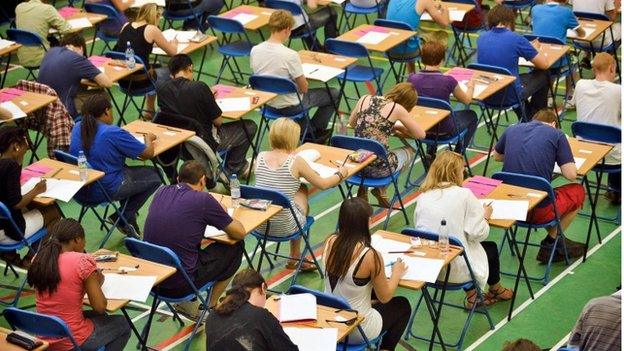
The last academy in Knowsley that teaches A-levels has decided to close its sixth form
How could there be an entire local authority in England where no pupil can take an A-level?
That's the prospect facing parents in Knowsley on Merseyside.
If that was happening in green-wellied Oxfordshire or the sharp-elbowed London boroughs there would have been a storming of the barricades. Howls of anguish would be rattling the windows of the Department for Education.
There would be outrage about university places. Parents would want to know why their children had to fight for places in other authorities.
There would be warnings about social mobility going into reverse and a great leap backwards.
But in Knowsley the last school in the borough offering A-levels is planning to shut down its sixth form.
The governing body of Halewood Academy voted last month to close the sixth form, external, pending a consultation that finished at the weekend.
The academy says that its current sixth form is financially unviable.
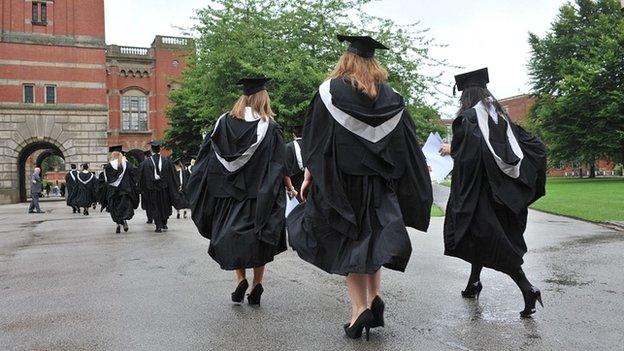
Knowsley already has one of the lowest levels of university entry in England
It says that the break-even point is 155 sixth formers - and although in 2011-12 it had 157, since then the numbers have been below this level and as such it is no longer affordable.
The academy is proposing to stop taking new sixth formers from this autumn, with the assumption that pupils could travel to schools in other authorities.
Many Knowsley pupils already go to schools in neighbouring authorities for their post-16 education, but it depends on such schools having places available.
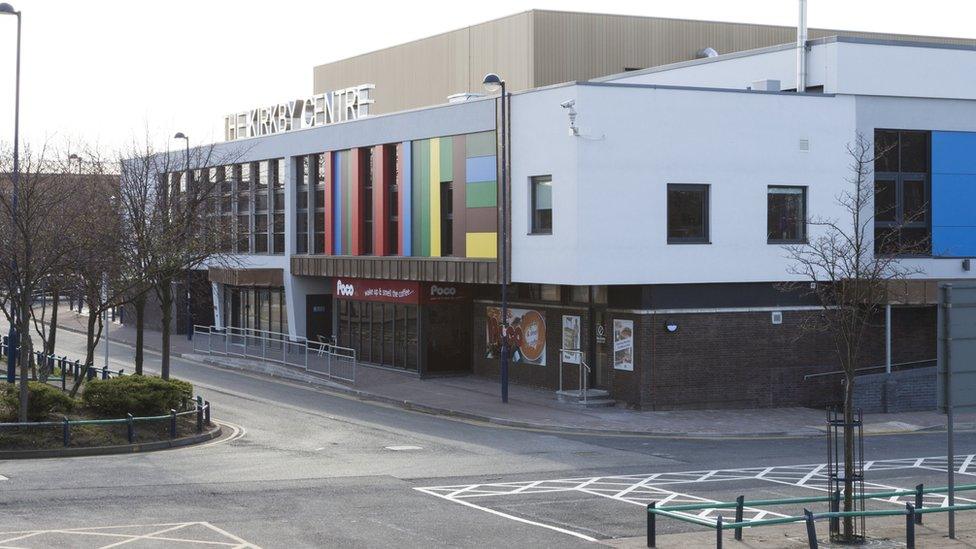
Parents in Knowsley say closing the last sixth form is letting down the young people in their community
The local authority says that as this is an academy, they can't intervene.
"As an academy, it receives its funding direct from government and not from Knowsley council.
"Whilst we, as the local authority, do work with all our local academies to help them improve education standards, as an academy the school is ultimately accountable to the regional school commissioner, and not the local council."
Parents have set up a protest page on Facebook, external, with comments about how difficult it is to get a clear answer from anyone about what is going on.
"Who is accountable? Nobody knows. Who do we get in touch with?" says Vanessa Pointon, a parent at the school.
"This is letting down the children of this community. There are people who want to go to university, lots of kids who want to do well," she says.
What kind of message does it send to young people to have no sixth forms offering A-levels?
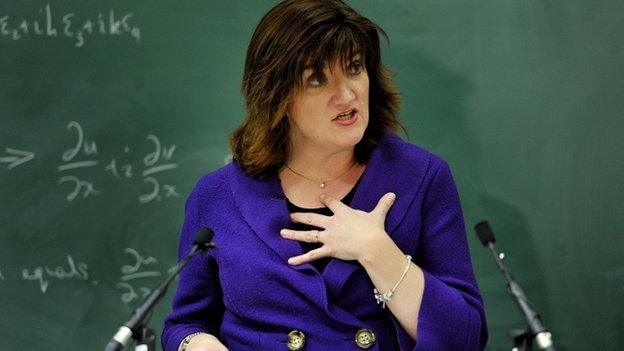
Nicky Morgan has published a White Paper promising "Educational Excellence Everywhere"
Knowsley already has among the lowest university entry rates in the country - and now young people are being told that none of their schools is even going to offer a single A-level.
It is hard to think that since A-levels were introduced in the 1950s that there has ever been an authority where none of its schools offered the qualification.
Sir Peter Lampl, chairman of the Sutton Trust, said: "It is important that young people have the opportunity to access a good choice of A-levels wherever they live.
"For social mobility and access to Russell Group universities, this often means academic subjects like physics, chemistry, further maths and languages."
Sir Peter said that despite funding challenges, it was "crucial" that "such choices aren't curtailed".
The Knowsley example raises questions about how a future school system could operate where all schools are autonomous academies.
If school decisions are outsourced to academy chains, who will provide an overview?
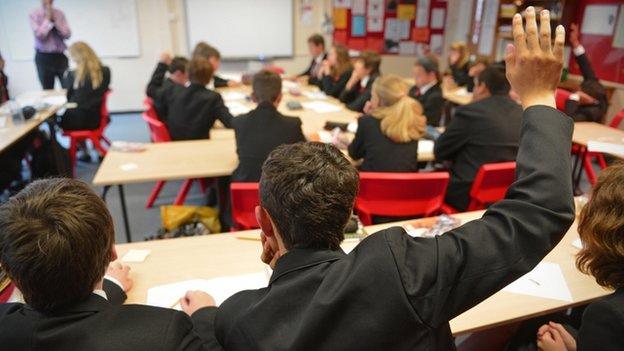
What is the role of regional schools commissioners in deciding what academies offer?
There will be six secondary schools in Knowsley, a mix of academies and local authority schools, and if Halewood's proposal goes ahead, none of them would offer A-levels.
Academy chains can operate across many different local authorities - and what works for them as a chain might not be the same as local interests.
A Department for Education spokesman said ministers would be meeting MPs in Knowsley about the proposed sixth form closure.
But the department says that if the school wants to push ahead with closure it will still have to be approved by education officials.
"It must make the case to the Education Funding Agency and the regional schools commissioner that post-16 provision in the area would not be adversely affected by the closure before it can be given permission to close it."

Going forwards or backwards? Shopping in Kirkby in Knowsley in 1967
Does this mean that the Department for Education will be able to intervene?
This is where things are far from clear.
Regional schools commissioners, appointed by the government, are the officials responsible for overseeing academies. They can intervene if academies are underperforming or where their governance is weak.
But can they force an academy, or academy chain, to change what it teaches or the age groups?
It's a far-reaching question, because what if regional schools commissioners were allowed to intervene and decide on matters such as admissions policies? Could they subsidise a sixth form that an individual academy could not afford?
Could they change how schools select or who they admit?
It's a political balancing act, because if they are bystanders, they will be dismissed as pointless. If they're given powers to intervene, including in good and outstanding schools, they will be attacked as bureaucrats trampling on parents' rights.
The Education Select Committee has warned of a lack of clarity about the role of the regional schools commissioner and that they risked being seen as "undemocratic and opaque".
They heard evidence that nine out of 10 parents did not understand what commissioners were meant to be doing.
"As we move towards a system of full academisation, the role of regional school commissioners will continue to grow and evolve," says the Department for Education.
The government, setting out plans to compel all schools to become an academy, has called its White Paper "Educational Excellence Everywhere".
But parents facing the prospect that none of their local schools will allow their children to take A-levels must wonder if "everywhere" means somewhere else.
- Published14 February 2016

- Published1 February 2016
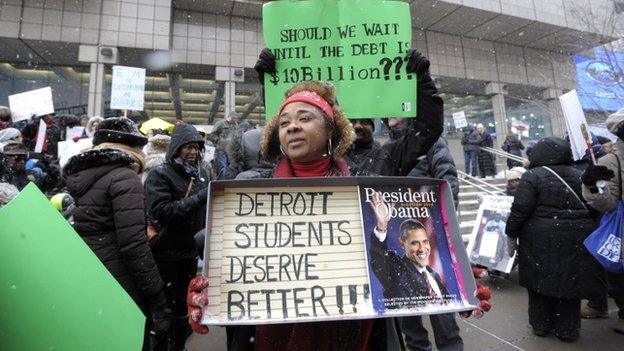
- Published21 May 2014
